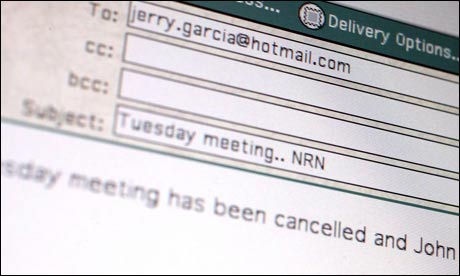
Over the past week, scores of emails bounced back and forth as we finished editing The Shape of the Dance, Michael Donaghy's Selected Prose. The weight of correspondence set me thinking about the future of the letter. Surely it's only a matter of years until the first Selected Emails arrives? And when it does, how will it arrive? And what will be lost?
Will we be able to download the complete correspondence of our favourite authors and search their emails with the same ease we now search our own accounts? By correspondent or by date sent? Or more esoterically by certain words: finding all emails that contain ''light'' or ''love'' or ''regret''?
Just think about all the coincidences that would be lost in reading in such a way; the names that jump out at us from the index, the unforeseen pleasures we derive from the messy patterns by which most of us read anything "Collected" or "Selected". Reading John Betjeman's letters recently I found myself heading straight for the index and - despite the neat sections the editor had divided the letters into - enjoying jumping forwards and backwards haphazardly across the decades.
In a Selected Emails will we get the chance to glimpse some of proclivities and more arcane workings of the writer's mind? Will the weight of ephemera itself be the thrill as we eavesdrop on conversations we were never meant to hear, as defunct friendships and thwarted love affairs are played out? Will hidden enmities be revealed as we see not only who the writer replied to, but also who they ignored and whose correspondence they sent straight to the trash? Will we learn a little more about them by knowing what they ordered from Ocado or LOVEFiLM that week? Will this profusion of detail help us better understand the people behind the work we love or will our sense of them be irreparably muddied?
And why stop at emails? Will future literary tourists no longer need to travel to the homes of writers, but rather make online pilgrimages to their defunct social networking sites? ''To the left you can see where X posted a comment on Y's wall … it's believed they actually DID meet for coffee latter that week … and now to their internet history, which I think you'll agree puts a completely different complexion on X's writing".
In The Shape of the Dance, Donaghy reviews TS Eliot's Inventions of the March Hare, a collection of Eliot's previously unpublished work, and gets to the crux of the problem as he asks us to imagine "a digitally remastered CD of all the mistakes Alfred Brendel made when learning the piano" or "the telephone doodling pads of Francis Bacon with extensive commentary by Brain Sewell". Adding that such exercises can only be of value to "the pathologically obsessive fan or the professionally obsessive academic". However laudable the desire to preserve, do we need to forget some things to better remember others?
Think how Philip Larkin's reputation and the public perception of him was changed on the publication of his letters and their revelation of his more unsavoury opinions. Will the bonfire at the end of the garden be replaced my the literary executor rushing, magnet in hand, to wipe the hard drive of the late writer?
The email as an epistolary form is still in a state of flux; part letter, part throwaway comments, part idle chatter. What distinguished writers' letters, the ones we enjoy returning to again and again, is that they have subjected themselves to certain formal restrictions. Think of James Joyce's love letters to Nora Barancle, those works of virtuoso erotica that derive their power from the intimacy of the mode of address and our voyeuristic thrill of reading them.
Byron said, "Letter writing is the only device for combining solitude with good company". My gut feeling is that the epistolary arts still exist electronically (especially with the price of stamps these days) but there is much more background noise to be cut through. When they do arrive, they Selected Emails might best be thought of as providing access to the rehearsals, the corpsing, the fluffed lines and the bum notes: by all means read them, just don't read too much into them.
Some writers, of course, are already hip to the pitfalls that lie ahead. As Don Paterson suggests in his poem Web,
''The deftest leave no trace: type, send, delete,
clear history / The world will never know.''

